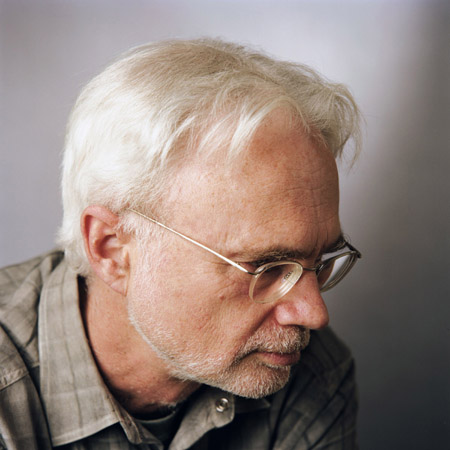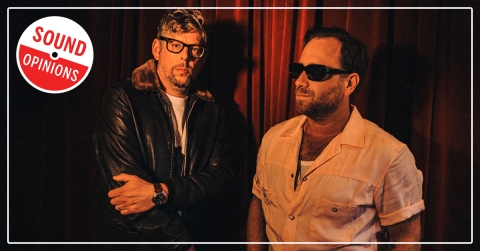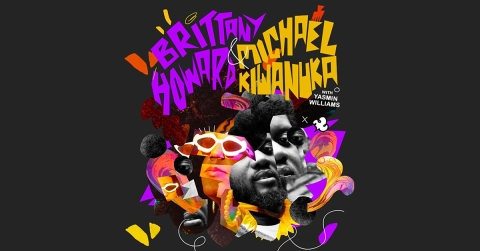John Adams made his Met debut Monday night with the opening of the new production of his 2005 opera Doctor Atomic. "This score continues to impress me as Mr. Adams’s most complex and masterly music," exclaims the New York Times's Anthony Tomassini. "Whole stretches of the orchestral writing tremble with grainy colors, misty sonorities and textural density." The Associated Press calls it an "intense and fascinating" work, in which "Adams has created a score filled with color, syncopation and lush interludes." Newsweek calls the production "stunning," the score "lyrical, romantic, Wagnerian by turns." Also, Bloomberg calls the composer's newest opera, A Flowering Tree, "Adams's most ravishing creation to date," and Slate finds his new memoir "gripping."
John Adams made his Metropolitan Opera debut Monday night with the opening of the Met's new production of Adams's 2005 opera Doctor Atomic, about J. Robert Oppenheimer and the creation of the atomic bomb. Under the leadership of first-time stage director Penny Woolcock (who directed the film version of Adams's The Death of Klinghoffer in 2003), the "production mixes metaphorical imagery and poignantly human interactions in dramatically involving ways," says New York Times classical music critic Anthony Tommasini.
Tommasini calls particular attention to Gerald Finley, who portrays Oppenheimer, as he did in the original production, directed by Peter Sellars (who also assembled the libretto):
The impressive baritone Gerald Finley, who created the daunting lead role unforgettably, brings his portrayal to the Met, grown even richer, more vocally visceral and emotionally nuanced, especially during Oppenheimer’s climactic Act I aria, a setting of Donne’s "Batter My Heart." Here is this brilliant, arrogant character’s only moment of doubt, anguish and despair.
The review says the "big news" of Monday's premiere was the debut of conductor Alan Gilbert, who drew "a revelation" of a performance from the orchestra and chorus, showcasing the beauty of Adams's score:
This score continues to impress me as Mr. Adams’s most complex and masterly music. Whole stretches of the orchestral writing tremble with grainy colors, misty sonorities and textural density. Mr. Gilbert exposes the inner details and layered elements of the music: obsessive riffs, pungently dissonant cluster chords, elegiac solo instrumental lines that achingly drift atop nervous, jittery orchestral figurations.
"Yet," he continues, "in bringing out the intricacies, he never impedes the music’s organic shape and forward thrust. The tension mounts as Mr. Adams builds up a din of pummeling rhythms and fractured meters, with orchestra chords exploding into shards of harmonic debris: call it Atomic Minimalism."
Among the "touchingly human scenes" the director has created, says Tomassini, are those with Oppenheimer's wife, "beautifully rendered" and "sung with aching, wistful intensity by the mezzo-soprano Sasha Cooke," including a scene in which the central couple "sing in a dialogue of quotations from the poets Baudelaire and Muriel Rukeyser, and Mr. Adams’s rapturous music is like updated, harmonically unhinged Debussy."
Read the full review at nytimes.com.
---
Ronald Blum of The Associated Press calls the opera an "intense and fascinating" work, in which "Adams has created a score filled with color, syncopation and lush interludes." He too cites the scene with the Donne text as "the most moving aria ... with a text from Donne's Holy Sonnet XIV interrupted by urgent, frantic music portending doom."
Blum notes that, since the premiere of the original production of Doctor Atomic, with much the same cast, "the primary singers' interpretations have deepened considerably. Finley, Fink and Owens managed their soaring vocal lines magnificently." He also credits the chorus, which "sang with beauty" and Gilbert, who "conducted with vigor and drama in his Met debut."
"Doctor Atomic," Blum concludes, "is proof that contemporary opera can be a fulfilling experience."
Read more at ap.com.
---
Variety's Eric Myers says that "Adams' restless, eclectic score keeps the mind engaged," and concurs that "the cast assembled for this production is a strong one."
He further describes Adams's music this way: "There are moments of violence in the score, moments of dreamlike beauty and a particularly striking use of silence at the opera's end to underscore the aftermath of the first bomb test at Los Alamos."
Myers also praises the principals, calling Finley "superb," offering: "He makes Oppenheimer a charismatic figure full of quick-witted nervous energy, thrilled by his success yet increasingly burdened with guilt over the devastation he will wreak."
Read more at variety.com.
---
Newsweek's Vibhuti Patel calls the Met's production "stunning," with Oppenheimer "magnificently sung by Gerald Finley."
The reviewer points in particular to the end of Act I, in which "Sellars uses Oppenheimer's favorite poem [Donne's "Batter my heart"], with its aptly violent metaphors of war, battle, conquest and submission, to reinforce the Faustian leitmotif as Adams abandons atonality for gorgeous music that he describes as an 'archaic trope.'"
Patel describes Adams's score as "lyrical, romantic, Wagnerian by turns, and it matches the enormity of his myth. The choral singing is grand as the libretto uses the Bhagavad Gita's horrific descriptions of universal destruction to create the terror of the bomb."
For more, visit newsweek.com.
---
In his review of a new DVD release of an earlier production for Bloomberg News, Robert Hilferty asserts: "The best part of Doctor Atomic is Adams's multilayered score, a daring mix of modernism harking back to Edgard Varese, sci-fi pulp electronics and soaring lyricism."
In the same article, Hilferty also reviews the recent Nonesuch release on CD of Adams's newest opera, A Flowering Tree, which he calls "Adams's most ravishing creation to date." Hilferty explains:
Adams's score, which he conducts himself, is awash in sensuous colors. Its most sublime moments are the four stretches of "transformation music" that miraculously suggest the fragrance of Kumudha's blossoms. Delicate, gossamer sounds hang in the air and seem to penetrate your nostrils.
For the full article, visit bloomberg.com.
---
Slate's Nathan Heller examines Adams's recently published memoir, Hallelujah Junction, using sound clips of Phrygian Gates, Harmonium, Nixon in China, Chamber Symphony, and On the Transmigration of Souls as musical examples of the various "voices" Adams has projected throughout his varied career.
Heller takes the reader through various works by this leader of "the first generation of post
–Sgt. Pepper classical innovators," beginning with early works like Phrygian Gates, with its "oscillating textures and sustained harmonies," and Harmonium, which, while expanding the ideas of the earlier piece, "isn't just an expansion of the same idea. It's almost a different music ... It's a musical language that's eloquent on its immediate terms—sonorous, majestic, and kinetic—and it made Adams' career."Of his relationship with the strictures of minimalism, another aspect of the composer's works, Heller writes: "Adams, at his best, set its high watermark." He says of a more recent work, the 2002 memorial for the victims of 9/11, On the Transmigration of Souls: "That piece, whose delicate score uses recorded city sounds, a libretto of found text, and a trumpet quoting Charles Ives, comes at the listener with chilling intimacy."
After looking at the many musics of Adams and reading the composer's thoughts behind them in Hallelujah Junction, concludes Heller, "it is the looming sense that Adams hasn't found his voice—not quite, not yet—that makes this book so gripping and his art so real."
Read the complete article, with streaming audio examples, at slate.com.
---
In a similar vein, The Guardian's Guy Dammann, in an in-depth interview with the composer, states that Adams "has yet to settle into any kind of comfort zone." The two discuss politics, drugs, and the current state of contemporary music at guardian.co.uk. You'll find a radio interview with the composer, recently broadcast on The Ticket, from BBC Radio World Service, at bbc.co.uk. The segment begins about 25 minutes into the show.
- Log in to post comments



